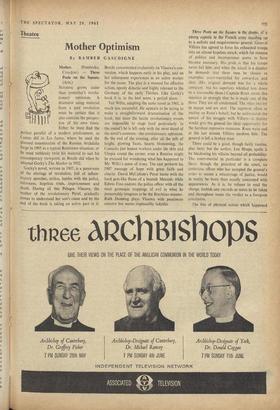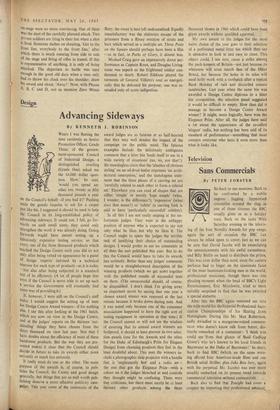Theatre
Mother Optimism
By BAMBER GASCOIGNE Mother. (Pembroke, Croydon.) — Three Posts on the Square. (Arts.) Gorky's novel, written in 1907, is a panorama of the stirrings of revolution, full of inflam- matory speeches, strikes, battles with the police, Informers, hopeless trials, imprisonment and death. During all this Pelagea Vlasova, the mother of the revolutionary Pavel. gradually comes to understand her son's cause and by the end of the book is taking an active part in it. Brecht concentrated exclusively on Vlasova's con- version, which happens early in his play, and on her subsequent experiences as an active worker for the cause. The play is a manual for effective action, openly didactic and highly relevant to the Germany of the early Thirties. Like Gorky's book it is, in the best sense, a period piece.
Ted Willis, adapting the same novel in 1961, is much less successful. He appears to be trying to make a straightforward dramatisation of the book, but since the hectic revolutionary events are impossible to stage (and particularly 'in the round') he is left only with the most dated of the novel's contents—the revolutionary optimism. By the end of the evening, after all the talk of bright, glowing faces, hearts blossoming, the Cossacks just honest workers under the skin and Utopia round the corner, even a Russian might be excused for wondering what has happened to Mr. Willis's sense of irony. The cast perform his 1907 message of hope with great faith and charity. David M'cCallum's Pavel burns with the hard gem-like flame of a beatnik Messiah, while Edwin Finn endows the police officer with all the most grotesque trappings of evil in what he presumably imagines to be the Brechtian manner. Ruth Dunning plays Vlasova with passionate concern but seems implausibly ladylike.
Three Posts on the Square is the .drama of a young captain in the French army standing up to a sadistic and megalomaniac general. General Villiers has agreed to force his exhausted troops into an almost hopeless attack, which for reasons of politics and incompetence seems to have become necessary. His pride is that his troops never fail him; and when the attack is a disaster he demands that three men be chosen as examples, court-martialled for cowardice, and shot. (His original demand was for a whole company. but his superiors whittled him down to a reasonable three.) Captain Roux resists this injustice so strongly that he is made one of the three. They are all condemned. The other two try to escape and are shot. The regiment oilers to mutiny on Roux's behalf, but he understands the nature of his struggle with Villiers—a mutiny would give the general the ideal opportunity for the harshest repressive measures. Roux waits and at the last minute Villiers pardons him. The general is left a broken man.
There could be a good, though fairly routine, play here; but the author, Leo Heaps, spoils it by blackening his villains beyond all probability. The court-martial in particular is a complete farce. though the president of the court, an ambitious officer who has accepted the general's order to secure a miscarriage of justice, would in reality be more than usually concerned with appearances. As it is, he refuses to read the charge, forbids any records or notes to be taken and throughout treats the verdict as a foregone conclusion.
The bits of physical action which happened
on-stage were no more convincing. One of these was the start of the carefully planned attack. Two private soldiers are lying in their but when a shot Is fired. Someone dashes on shouting, 'Get to the front line, everybody to the front line,' after which there is much running from side to side of the stage and firing of rifles in transit. If this is representative of anything, it is only of being attacked. The departure to battle was easy enough in the good old days when a man only had to throw his cloak over his shoulder, draw his sword and shout, 'Away!' Now, with Phases A, 13, C and D, not to mention Zero Minus Sixty, the event is best left undramatised. Equally unsatisfactory was the elaborate escape of the prisoners from a flimsy erection of struts and bars which served as a multiple set. Three Posts on the Square should perhaps have been a film —as in fact, in Paths of Glory, it almost was.
Michael Craig gave an impressively direct per- formance as Captain Roux, and Douglas Living- stone was superb as the frightened soldier con- demned to death. Robert Eddison played the torments of General Villiers's soul so energeti- cally that he defeated his purpose; one was re- minded only of acute indigestion.















































 Previous page
Previous page